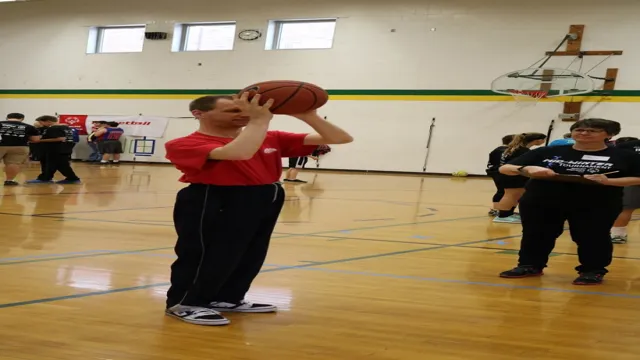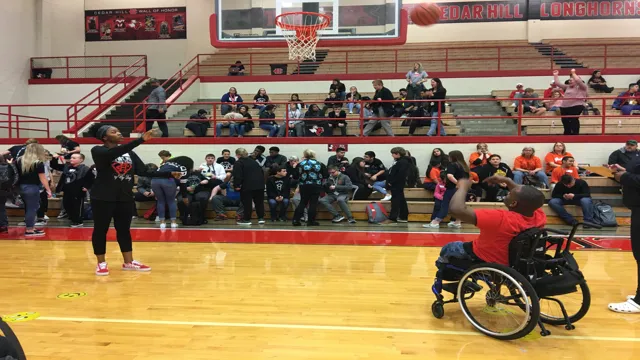Basketball is a popular sport enjoyed by millions of people worldwide. From amateur players to seasoned professionals, basketball has a way of bringing people together through the excitement and challenge it presents. But did you know that basketball can also be an excellent tool for promoting inclusion and enhancing the skills of people with intellectual disabilities? This is where Special Olympics Basketball Skills come in.
This initiative is designed to provide athletes with the opportunity to learn and improve their basketball skills while competing against others who face similar challenges. In this blog, we will explore the benefits of Special Olympics Basketball Skills, how it works, and how it’s helping to create a more inclusive society. So, join us as we explore the world of Special Olympics Basketball and see how it’s making a difference in the lives of athletes with intellectual disabilities.
Introduction
Special Olympics basketball skills tournaments are an exciting and inclusive way for athletes of all abilities to showcase their talents on the court. These events provide a unique opportunity for individuals with intellectual disabilities to develop their basketball skills and compete with other athletes who share their passion for the sport. Players with disabilities can learn and practice fundamental skills such as dribbling, shooting, passing, and defense, which can be applied in various situations during a game.
Through participation in these tournaments, athletes also develop their teamwork, communication, and sportsmanship skills, which are essential in all areas of life. Special Olympics basketball skills tournaments foster a sense of community, inclusivity, and respect for all athletes, regardless of their ability level. It’s always an exhilarating experience to watch these talented athletes showcase their special skills on the basketball court, and we can’t wait to see what they achieve in the future.
What is Special Olympics Basketball?
Special Olympics basketball is a unique sporting event that gives individuals with intellectual disabilities the opportunity to participate in a team sport and compete at a high level. It is a popular event with over 5 million athletes from 190 countries worldwide who compete in various sports, including basketball. Special Olympics basketball is played with official rules and regulations, but adjustments are made to accommodate the needs of athletes with intellectual disabilities.
The main goal of the sport is to promote sportsmanship, teamwork, and inclusion among athletes of all abilities. The players are divided into different categories according to their age, gender, and skill level, ensuring a level playing field for all athletes. Special Olympics basketball provides a platform for these dedicated and talented athletes to showcase their skills and abilities, while also raising awareness about the importance of inclusion and acceptance in our society.

Why are basketball skills important for Special Olympics athletes?
Basketball is not only a fun sport to play, but it can also be beneficial for individuals with intellectual disabilities who compete in Special Olympics. The importance of basketball skills for Special Olympics athletes cannot be overstated. These skills not only improve their physical health and well-being but also provide opportunities for social interaction and personal growth.
From learning teamwork and communication skills to developing hand-eye coordination and agility, basketball can help special athletes reach their full potential. With the right training and guidance, these individuals can build their self-confidence and develop a sense of accomplishment as they achieve their goals. Additionally, with basketball becoming increasingly popular among Special Olympics athletes, it offers them a chance to participate in a beloved sport just like their peers without disabilities.
Basic Basketball Skills
Special Olympics basketball skills are a set of basic basketball techniques that help athletes maximize their playing potential. These skills include dribbling, passing, shooting, defense, and rebounding. Dribbling is the ability to control the ball while moving, passing is the art of delivering the ball to teammates, shooting is the ability to score points, defense is how to stop opponents from scoring, and rebounding is grabbing the ball after a missed shot.
While these skills may seem simple, they require a lot of practice and repetition to master. Special Olympics coaches should focus on teaching and reinforcing these skills in their athletes to help them become well-rounded basketball players. By incorporating these skills into training and practices, athletes can improve their overall performance and enjoy the game of basketball.
Dribbling techniques
Basketball players at all levels require a solid foundation in basic skills to excel on the court. One of the fundamental techniques that can make or break a player’s game is dribbling. Good dribbling skills are vital in getting past defenders, executing plays, and creating scoring opportunities.
A player who has mastered dribbling can navigate the court with ease and create space for holding the ball or making passes. Basic dribbling techniques include learning how to keep your eyes up while dribbling, using both hands, mastering the crossover dribble, and learning to keep the ball low to the ground. In addition to this, practice is key to perfecting dribbling skills.
Repetition helps you build muscle memory and develop speed and agility with the ball. So, if you want to become an accomplished basketball player, make sure to focus on mastering dribbling techniques.
Shooting fundamentals
Shooting is one of the most essential skills in basketball, and having proper fundamentals is crucial to becoming a great shooter. It all starts with your feet positioning, where you want to have a solid base with your feet shoulder-width apart and your toes pointing towards the basket. Your knees should be slightly bent, and your weight should be evenly distributed.
Next, you want to grip the ball with your fingertips, not your palms, and bring it up to your shooting pocket, which is just above your shoulder. Once you’re in your shooting pocket, begin to elevate, using your legs to generate power, and extend your elbow and wrist to release the ball with a smooth flick of your wrist. Remember to follow through with your shot, holding your shooting hand in the air until the ball drops through the hoop.
By focusing on these basics, you’ll be well on your way to becoming a reliable shooter out on the basketball court.
Passing techniques
Passing techniques are an essential part of basketball skills that every player should master. Whether it’s a bounce pass, chest pass, or overhead pass, each one has its own unique benefits and proper execution. A bounce pass, for instance, is best used when passing to a teammate who is close to the ground, while a chest pass is efficient when you want to pass the ball quickly and precisely.
Meanwhile, the overhead pass is suitable when you need to pass over a defender to reach your teammate. To improve the accuracy and timing of your passes, practice and repetition are key. Instead of just passing to a stationary target, try to simulate game situations, such as passing while on the move or passing under pressure.
These drills will help you develop your passing skills and make it easier for you to create scoring opportunities for your team. Remember, passing is not just about getting rid of the ball, but also about creating opportunities for your teammates and contributing to the success of the team. So, keep practicing, stay patient, and focus on the goal.
Advanced Basketball Skills
Special Olympics basketball provides a unique opportunity for athletes to showcase their skills and abilities on the court. In addition to the fundamental skills of dribbling, shooting, and passing, advanced basketball skills come into play during game time. These skills include footwork, ball handling under pressure, and the ability to read defensive schemes.
Practice and repetition are key to developing these techniques and mastering them. Special Olympics basketball provides a supportive environment for athletes to learn and improve their skills, leading to greater confidence and success on the court. So, if you’re ready to take your game to the next level, keep working hard and practicing those advanced basketball skills!
Advanced dribbling techniques
Advanced dribbling techniques are crucial to becoming a skilled basketball player. One key technique is the crossover dribble, which involves quickly switching the ball from one hand to the other while simultaneously sliding your body in the opposite direction. This deceives defenders by making it unclear which direction you’ll be going, allowing you to create space and drive to the basket.
Another technique is the behind-the-back dribble, where you quickly dribble the ball behind your back with one hand to get past a defender. This move requires precise hand-eye coordination and footwork to execute properly. Additionally, the hesitation dribble is a great way to throw off defenders by stopping and starting quickly, which can create space for a shot or passing opportunity.
By mastering these advanced dribbling techniques, you can elevate your game to the next level and become a standout player.
Offensive strategies
In basketball, offensive strategies are crucial to winning games. Advanced basketball skills are essential for executing these strategies effectively. One of the most important skills to develop is reading the defense and adapting to their tactics.
Good offensive players constantly move around the court, cutting and screening to find gaps in the defense. At the same time, they need to be able to identify weaknesses in the defense and exploit them. This can be achieved through dribbling skills, shooting accuracy, and passing abilities.
Players with advanced skills also possess the ability to think on their feet, responding to sudden changes in the game. Through relentless practice and experience, players can develop their offensive skills to become unstoppable forces on the court.
Defensive strategies
When it comes to basketball, having strong defensive strategies can make all the difference in a game. It’s important to remember that defense isn’t just about stopping the other team from scoring. It’s also about anticipating their moves and forcing them into making mistakes.
One advanced skill that can be especially helpful on defense is the ability to read the game. This means paying attention to the other team’s patterns and tendencies so you can predict their next move. Another important defensive strategy is communication.
It’s crucial to talk to your teammates on the court so you can work together to anticipate the other team’s plays and adjust your defense accordingly. Ultimately, practicing and mastering these advanced defensive skills can make a big difference in your team’s success on the court.
Benefits of practicing Special Olympics Basketball Skills
Participating in Special Olympics basketball skills training brings numerous benefits to athletes with intellectual disabilities. Not only does it improve their overall physical health, but it also strengthens their social skills and self-confidence. Through regular practice and games, athletes learn teamwork, communication, and problem-solving skills, all of which are essential in building meaningful relationships.
Additionally, participating in Special Olympics basketball skills training is an opportunity for athletes to explore their potential, express themselves, and have fun in a safe and supportive environment. By enhancing their abilities, athletes can become more independent and improve their daily living skills. Ultimately, Special Olympics basketball skills training offers athletes a chance to develop their talents, make friends, and achieve their personal goals.
Conclusion
In the world of basketball, the Special Olympics athletes are nothing short of amazing. Their skills, dedication, and enthusiasm leave us in awe, wondering how they do it all. But the truth is, what sets them apart is not just their physical talent, but also their unwavering spirit and determination.
As we watch these athletes defy odds and shatter stereotypes, we are reminded that anything is possible if we believe in ourselves and our abilities. So let us all take a page from the Special Olympics basketball playbook and shoot for the stars, one basket at a time.”
FAQs
What are the Special Olympics Basketball Skills?
The Special Olympics Basketball Skills are a series of challenges that test athletes’ abilities in dribbling, passing, shooting, and rebounding.
How are the Special Olympics Basketball Skills competitions organized?
The Special Olympics Basketball Skills competitions are usually organized in a circuit format, where athletes move through different stations to complete the challenges. Scores are tallied and winners are determined based on their overall performances.
Can athletes with intellectual disabilities participate in Special Olympics Basketball Skills?
Yes, Special Olympics Basketball Skills competitions are open to athletes with intellectual disabilities who are at least eight years old and have had at least eight weeks of training in basketball skills.
How can athletes and coaches prepare for Special Olympics Basketball Skills competitions?
Athletes and coaches can prepare for Special Olympics Basketball Skills competitions by practicing the different challenges, studying the rules of the competition, and working on their teamwork and communication skills on the court.


